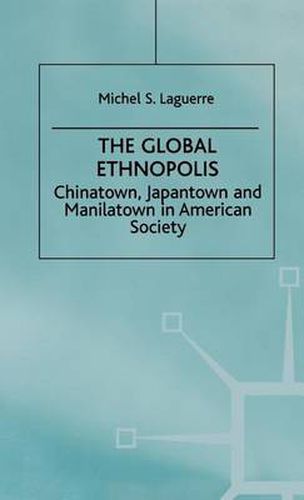Readings Newsletter
Become a Readings Member to make your shopping experience even easier.
Sign in or sign up for free!
You’re not far away from qualifying for FREE standard shipping within Australia
You’ve qualified for FREE standard shipping within Australia
The cart is loading…






This title is printed to order. This book may have been self-published. If so, we cannot guarantee the quality of the content. In the main most books will have gone through the editing process however some may not. We therefore suggest that you be aware of this before ordering this book. If in doubt check either the author or publisher’s details as we are unable to accept any returns unless they are faulty. Please contact us if you have any questions.
This book focuses on three ethnic neighbourhoods in San Francisco - commoditized Chinatown, gentrified Japantown, and defunct Manilatown - and argues that the city is global because it comprises a multiplicity of global niches that interface with and sustain one another at the local level. According to the author, these enclaves are not simply transnational communities but, rather, global ethnopoles. They must be seen within the logic of globalization and not simply that of transnationality. The early emphasis on transnationality is misplaced because it looks at the process and not the outcome. Transnationality is the means by which, or the conduit through which, the global ethnopole is produced. The focus here is on various processes of border-crossing practices, connections, and flows in order to examine the globalized locality and the localized globality. Any theory of transnationality presupposes a theory of globalization. In other words, transnationality is the process by which globality is effected.
This new approach of studying ethnic enclaves within the framework of globaliz-ation theory forces us to connect local activities and processes to a much larger universe. However, the view that diasporic communities maintain transnational rel-ations with their homelands is not new, though only recently have social scientists begun to unravel their various layers of interconnectedness. What is needed now is not simply a description of the enclave- homeland relationship but, also, an analysis and comparison of the transnational modalities of incorporation, operation, and reproduction of these ethnopoles, as well as the’“global city’ status that is the hallmark of their identity.
$9.00 standard shipping within Australia
FREE standard shipping within Australia for orders over $100.00
Express & International shipping calculated at checkout
This title is printed to order. This book may have been self-published. If so, we cannot guarantee the quality of the content. In the main most books will have gone through the editing process however some may not. We therefore suggest that you be aware of this before ordering this book. If in doubt check either the author or publisher’s details as we are unable to accept any returns unless they are faulty. Please contact us if you have any questions.
This book focuses on three ethnic neighbourhoods in San Francisco - commoditized Chinatown, gentrified Japantown, and defunct Manilatown - and argues that the city is global because it comprises a multiplicity of global niches that interface with and sustain one another at the local level. According to the author, these enclaves are not simply transnational communities but, rather, global ethnopoles. They must be seen within the logic of globalization and not simply that of transnationality. The early emphasis on transnationality is misplaced because it looks at the process and not the outcome. Transnationality is the means by which, or the conduit through which, the global ethnopole is produced. The focus here is on various processes of border-crossing practices, connections, and flows in order to examine the globalized locality and the localized globality. Any theory of transnationality presupposes a theory of globalization. In other words, transnationality is the process by which globality is effected.
This new approach of studying ethnic enclaves within the framework of globaliz-ation theory forces us to connect local activities and processes to a much larger universe. However, the view that diasporic communities maintain transnational rel-ations with their homelands is not new, though only recently have social scientists begun to unravel their various layers of interconnectedness. What is needed now is not simply a description of the enclave- homeland relationship but, also, an analysis and comparison of the transnational modalities of incorporation, operation, and reproduction of these ethnopoles, as well as the’“global city’ status that is the hallmark of their identity.